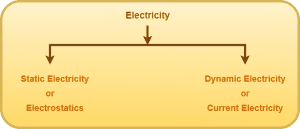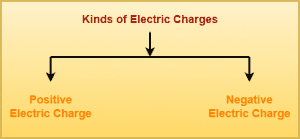Electricity-
| The branch of physics which deals with the study of electric charges is called as Electricity. |
There are two branches of electricity-

1. Static Electricity-
The branch of physics which deals with the study of electric charges at rest is called as static electricity also called as electrostatics.
2. Current Electricity-
The branch of physics which deals with the study of electric charges in motion is called as current electricity.
Electric Charge-
Electric charge may be defined as-
|
Like mass, electric charge is one of the fundamental attributes of the elementary particles (electrons & protons) of which the matter is made. OR Electric charge is an intrinsic property of elementary particles of matter which gives rise to electric force between various objects. OR Charge of a material body or particle is the property (acquired or natural) due to which it produces and experiences electrical and magnetic effects. Some of naturally charged particles are electron, proton, alpha particle etc. |
- The electric charge on an object can be measured and hence it is a physical quantity.
- Electric charge is a derived physical quantity.
- Electric charge is a scalar quantity.
- Electric charge can never be isolated from matter.
Units of Electric Charge-
- The SI unit of electric charge is coulomb denoted by C.
- The CGS unit of electric charge is electrostatic unit denoted by esu.
Dimensional Formula of Electric Charge-
We know, electric current is defined as rate of flow of electric charge i.e.
I = Q / t
So,
Q = I x t
Now, the dimensional formula of electric charge can be given as-
[Q] = [I] x [t]
[Q] = [A] x [T]
[Q] = [AT]
| Thus, dimensional formula of electric charge is [AT]. |
Kinds of Electric Charges-
There are two kinds of electric charges-

1. Positive Electric Charge-
- Positive electric charge on a body represents the deficiency of electrons as compared to the number of protons.
- It is denoted by a + sign.
- Example- A proton has a positive charge +e where e = 1.6 x 10-19 C.
2. Negative Electric Charge-
- Negative electric charge on a body represents the excess number of electrons as compared to the number of protons.
- It is denoted by a – sign.
- Example- An electron has a negative charge -e where e = 1.6 x 10-19 C.
Properties of Electric Charge-
The basic properties of electric charge are-
- Additive nature of electric charge
- Conservation of electric charge
- Quantization of electric charge
- Invariance of electric charge
1. Additive Nature of Electric Charge-
|
According to additive nature of electric charge, The electric charge is additive in nature i.e. total charge on an extended body is the algebraic sum of all the charges located in different regions of the body. |
If a system contains charges q1, q2, …….., qn then its total charge is-
q = q1 + q2 + …….. + qn
2. Conservation of Electric Charge-
|
According to conservation of electric charge, The net electric charge of an isolated system remains constant whatever changes takes place in that system. OR Electric charge can neither be created nor be destroyed in an isolated system. |
It suggests that there can be transfer of electric charges from one body to the other body but there is no creation or destruction of electric charges in an isolated system.
3. Quantization of Electric Charge-
|
According to quantization of electric charge,
Electric charge on any body always exists in integral multiples of elementary charge. |
Mathematically,

where-
Q = total charge on body
n = an integer value 0, 1, 2, 3, ……
This happens because electrons are always transferred in integral values from one body to another body.
4. Invariance of Electric Charge-
|
According to invariance of electric charge, The magnitude of electric charge on a body does not vary with the speed of the body. OR Charge on a body is independent of the speed of the body. |
QUIZ TIME
Click here to take a quiz on this article!
Read the next article on-
Electrification | Methods of Charging
Get more notes & other study material of the Chapter Electric Charges & Field.

